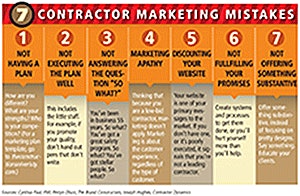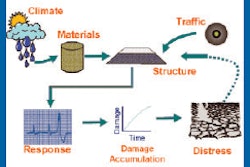Know Your Business series, Part IV
Give people a business excuse to choose you above your competition
There are several contractor misconceptions about marketing, says Cynthia Paul with industry consultant FMI. First, marketing is not sales. Second, it’s not just directed at gaining new customers; In fact, 80 percent of it should be directed at your existing clients. Third, it’s not voodoo.

Unfortunately, marketing can seem like overhead, says Mike Stark with the Associated General Contractors of America. “Contractors are typically looking for more clients, better clients, and clients that align with their businesses. And during the downturn, many were chasing everything just trying to keep the lights on.”
But just like a construction project, your marketing has to have a blueprint, which starts with a look-in-the-mirror exercise, Stark says. “Some of it might be eye opening, but it will help you focus on your strengths and not chase everything.”
While a marketing plan doesn’t have to be complicated, it does have to answer some key questions:
• How is your company different? What are your strengths?
• Who is your competition?
• What do you want to communicate?
(To access Paul’s marketing plan template for small contractors, go to theconstructionuniversity.com.)
And you’re not off the marketing hook if you participate primarily in the low-bid arena. “People forget customer experience is a real live selection criteria,” Paul says. “If you’re a pain in the butt to deal with, if your clients have any option, they’re going to find a way to use someone else.” Beyond that, great customer experience on a low-bid job will help you get information faster, get change orders approved and get access to different parts of the job.
Get smart about your competition
Examining your competition is a key part of your marketing plan. “Contractors say they know everything about their competition,” Paul explains, “but they need to go deeper. They need to know their competition’s target markets, and which clients they will go at great lengths – and expense – to protect. What do they offer and how is it different from what you do?” As part of this exercise, be sure to get candid feedback from your clients on how you’re doing, and how they view your competition.
Don’t depend on the typical war story on how a competitor didn’t come through, warns Paul. If they’re still getting work, then they must be doing something right. What is it?
Realize a critical part of your marketing plan is how you fulfill the promises you made. “If you market your business before you create the systems and processes to get these things done, you’ll hurt yourself more than you’ll help,” Paul says.
Websites are a basic
Paul is blunt: If you don’t have a website, it shows you’re not a leader in your market. It will make you look little, regardless of your size.
“I fought it for a long time, but I was shooting myself in the foot,” says Paul Moore, president of the $5 million Moore Corporation, Trussville, Alabama. “You need to just suck it up and get it done.” In Moore’s case, that meant using an outside consultant, a process that took about four months. Moore’s site (www.moorecorp.com) has been up about a year, and he has seen results for his industrial and commercial building firm. “I’m working on a proposal right now for an industrial client who saw our site. Because of it, I got a chance to work for them. It helped legitimize my company.”
“Think of a website as an electronic brochure,” Paul says. “Talk about who you are, what services you offer, what markets you’re in, showcase your projects, offer some customer quotes, and tell how to contact you. Don’t make it complicated. You want to provoke questions, and give people a way to contact you.”
“Very few people come to your website to make a buying decision,” says Joseph Hughes with marketing consultant Contractor Dynamics, “and yet too much emphasis is made on that decision.” And websites aren’t just for clients. “Vendors and financing companies want to know they are dealing with someone reputable,” he says.
“Owners are using websites to research your capabilities,” says Ron Worth with the Society of Marketing Professional Services. Worth advises contractors to divide out their sites by the markets they serve. For example, if you do site development and road building projects, make sure each type of project gets a separate section. “Someone who’s putting together a project in one market won’t be as interested in what you’ve done in others,” he says.
Take social media one step at a time
At least have a presence on social media, advises Paul. “You don’t have to be exotic.” Pick a platform such as LinkedIn, and consistently update it. Assign the updates to a younger person in organization, and learn from them. And realize this isn’t just for your clients; it’s also a recruiting tool. And since few contractors now are using it, it’s an easy way to get a leg up on your competition.

Moore has come to appreciate LinkedIn, which he uses to promote his capabilities and stay in touch with other contractors. “It gives me a reason to call someone,” he says. “I can say I saw the information on LinkedIn as a way to start the conversation.”
And if you’re not on social media, don’t think it means no one is talking about you, says Perryn Olson with construction marketing consultant The Brand Constructors. “At least when you’re on social media, you know what’s being said about you.”
Educate
“Educate your target market,” Hughes says. “Provide them with monthly tips and establish yourself as the go-to expert in your area.” But also realize this takes time, and must be part of a longer term strategy. “Everyone say’s they’re the best, and they’ve been in business for X amount of years. Instead, educate the buyer on how to purchase contracting services, and let them know how you do things, especially if a portion of your clientele does not regularly buy your services.” For instance, what steps should a commercial client take when considering a new parking lot?
Worth agrees. “One school building contractor interviewed their clients about what advice they would give to other school superintendents who were considering a construction project,” he says. “They took a picture of each superintendent, put their advice in a small book, and handed it out.” In addition to offering helpful information, “I bet everyone interviewed has that book in their office,” Worth says.
In another instance, a contractor vying for a controversial multifamily development surveyed the surrounding neighborhood, asking residents about their concerns, and what would make them feel better about the project. They presented the results in their proposal. “It gave the developer information it didn’t previously have,” Worth adds, putting their proposal on another level.
“There’s just no easy button,” Hughes says about marketing. “You can’t just do one thing and expect to grow your business. Have a long-term strategy and be patient. Things do happen over time if you are consistent with them.”

Want to know more about managing your business?
Visit theconstructionuniversity.com for tips, articles and infographics on a wide range of business topics. And while you’re there,read last month’s article on Tracking Your Business Costs.
For further information:
Joseph Hughes
Contractor Dynamics
Perryn Olson
The Brand Constructors
Cynthia Paul
FMI
Michael Stark
The Associated General
Contractors of America
Ron Worth
Society of Marketing
Professional Services













